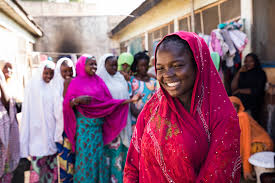The Abuse Of The Right To Sexual And Reproductive Health In Nigeria: The Way Out
No Comments yetSomewhere in Osun State, Nifemi, a three-year old baby, has been put under the knife for her clitoris to be cut off. Somewhere in Zamfara, thirteen-year-old Aisha has been betrothed to a 65-year-old Alhaji. Somewhere in Lekki, ten-year-old Ayoola is being sexually abused by his uncle. Somewhere in Zamfara, new mother, Aisha, just drew her last breath after bleeding profusely due to the negligence of the medical practitioners that handled her childbirth. Each of these people are victims of the failed healthcare system which Nigerians are constantly being subjected to. For a long period of time, the issue of the abuse of the right to sexual and reproductive healthcare in Nigeria has been ignored like a slowly growing pimple. However, the previous pimple has now developed into an unavoidable boil ridden with pus and blood. Much to the chagrin of the powers that be, the ripple effects of the poor handling of sexual and reproductive health in Nigeria, can no longer be swept under the carpet.
The World Health Organisation defines reproductive health as: “A complete state of physical, mental and social wellbeing, and not merely the absence of disease or infirmity in all matters related the reproductive system, its functions and its processes” [1]. The right to sexual and reproductive health has slowly garnered recognition over the past five decades. From the World Population Conferences in Rome and Belgrade held at 1958 and 1965 respectively [2], to the Beijing Conference of 1995 [3]; reproductive and sexual health has constantly been reaffirmed as a sine qua non in the lives of both men and women. In Nigeria, several Acts, and policies alike, have been enacted in order to guarantee this right to every Nigerian. They include, amongst others: The HIV(Anti-Discrimination) Act, 2013; the Violence Against Persons Prohibition Act, 2015; and the National Strategic Framework for the Elimination of Obstetric Fistula in Nigeria (2019-2023) [4].
However, the Nigerian situation seemingly sings a different tune. In spite of the existing legal framework, there have been numerous cases bordering on the flagrant abuse of the right to reproductive and sexual health in Nigeria- ranging from child marriage to sexual violence.
Currently, Nigeria has the highest number of child brides in Africa [5]. Over 20% of global maternal deaths occur in Nigeria with a staggering 600,000 maternal deaths enumerated from 2005-2015 [6]. In the same vein, over 25 percent of Nigerian women have been circumcised, with Osun State hosting the highest prevalence rate of 77 percent [7]. Each of these violations have negative effects on victims, hence, the global attention which the right to reproductive and sexual health has attracted. For example, there has been no report on the health benefits triggered by Female Genital Mutilation; however, numerous studies and research works have reported the harmful effects of female genital mutilation which could range from immediate complications which include: shock, haemorrhage and genital tissue swelling; to long-term complications which include: pain during sexual intercourse, urinary tract infections and menstrual problems [8].
Likewise, child marriage holds grave health consequences for the girl child. Young mothers are more likely to experience health conditions such as obstetric fistula [9]; disturbingly still, girls between ages 10 to 14 are five times more likely to die at pregnancy and childbirth than women between ages 20 to 24 [10]. In the light of these disturbing statistics, the lurking question remains-how do we stop the abuse of the right to sexual and reproductive health?
There is no gainsaying the fact that law qualifies as one of the most effective instruments for social control. As a backdrop for this, there is the need to create a strong legal framework which would effectively battle the violation of the right to sexual and reproductive health in essence, reducing such violations to the barest minimum. One of the major causes of the alarming prevalence of the violation of the right to reproductive and sexual health in Nigeria, can be attributed to the shaky legal system that governs the concept. For example, the recently enacted Violence Against Persons (Prohibition) Act, 2015, currently stands as the first and only federal legislation which explicitly prohibits female genital mutilation [11]. This, however, has not reduced the rate of Female Genital Mutilation, as only thirteen states having been recorded to have domesticated the act [12]. This has proved to be a bottleneck in the battle against the menace of female genital mutilation. Likewise, Nigerian legislations do not seem to protect gender interests.
For example, the Criminal Code does not recognise that boys are indeed, susceptible to acts of sexual violence. The statute stipulates a penalty of life imprisonment for persons who have unlawful carnal knowledge of girls below the age of thirteen [13], and merely prescribes a seven-year sentence for persons who are found guilty of unlawfully “dealing with” a boy under 14 years [14]. This is rather disheartening, considering that studies have proved that boys are just as susceptible to sexual violence [15].
In essence, in order to stop the abuse of the right to sexual and reproductive health, there is the need to create a strong legal framework which attends to the
needs of both genders; and in the same vein, prescribes strict punitive measures to be meted out on people who either induce, perpetuate, or participate in sexual violence. It is pertinent to note that legislations ought to reflect informed decisions which are aimed to protect all classes of people in the society. The achievement of this feat is largely hinged on the need for women in legislative positions. Research has proven that the burden of reproductive health problems is usually on women [16]. However, women occupy only about 6 per cent of federal legislative seats [17]. Hence, the need for gender balance in legislative houses is a viable tool which is capable of propelling the Nigerian legal system towards curbing the menace of the abuse of the right to sexual and reproductive health.
Furthermore, it is worthy of note that whilst creating a strong legal framework where violators can be brought to book is quite important, severe punishments do not always serve as strong tools for deterrence [18]. Nigeria is a largely patriarchal society; hence, a large number of the acts of violation usually perpetrated, are linked to cultural and religious roots. In essence, even when laws are enacted to prohibit certain acts, such acts would only be perpetrated in secret. This is because the rate of obedience to prohibitive laws is usually low if such laws contradict the norms of the people. This is where mass sensitization comes in. There is the need to conduct mass campaigns in order to educate the people on the ills of harmful traditional practices, and on the need to protect the sexual health of targeted persons in the society. In order to achieve this, it is important to focus such symposia on traditional and religious leaders. Studies have shown that people usually heed to the dictates of their traditional and religious leaders [19], as they are seen as custodians of the divine authority bestowed by God. With the involvement of traditional and religious leaders, there would be a higher chance that the people would heed to calls for the abandonment of harmful traditions and norms. In the same vein, it is pertinent to note that the target audience for such campaigns and symposia should not be limited to the women and girls in rural areas alone. For example, the prevalence of Female Genital Mutilation in urban areas in Nigeria, is relatively high, compared to its prevalence in rural areas [20]. This shows that sensitization ought to be targeted at inhabitants of both urban and rural areas; as both classes of people function as perpetrators of the abuse of the right to sexual health. Thus, in areas where sensitization fails, the law would take over and vice versa. Both the law and sensitization are complementary.
Research has proven that one of the leading causes of child marriage is poverty [21]. In the same vein a study by World Bank reports that there is a huge gap between the prevalence of female genital mutilation amongst girls from rich backgrounds and girls from poor backgrounds [22]. What this means is that a large number of the traditional practices usually perpetuated by the Nigerian people are borne out of economic inadequacies. Also, one would notice that poor men usually prefer to see sexual intercourse with their wives as a form of leisure. Most times, since these men cannot afford relaxation centres or leisure courts, when they get back from their respective energy-consuming low-paid jobs, they turn to the only viable form of relaxation- sex. In order to put a stop the menace of harmful practices perpetrated on girls by women, there is the need to improve economic conditions in the country. It is submitted, that the recent proposal of Value Added Tax (VAT) increase, would only aggravate the drastic state of reproductive health in Nigeria. This is because even the poorest people would be taxed heavily. The ripple effect of this is that, a man who can barely afford to feed his family members, would neither desist from seeing sex as a form of relaxation nor spare a second’s thought to any plans for family planning.
It is therefore recommended, that the government put in extra effort into creating more affordable reproductive and sexual health services for the benefit of the masses and in the same vein, implement financial policies that are people and pocket-friendly.
In conclusion, it is of utmost importance that a country which seeks to move forward economically and politically, pays attention to reproductive and sexual health issues. This is because the youths are usually badly hit when the reproductive health policies in a nation, are either non-existent, unimplemented, or inadequate [23]. Needless to say, the youths have a stronghold on the labour force of Nigeria.
This means that whatever hits the youths, hits the economy. In the same vein, in tandem with the popularly chanted mantra, youths are indeed, the leaders of tomorrow. Any form of complacency as regards the issues that affect them, could ultimately destroy the political future of Nigeria.
It is therefore, highly recommended that the issues highlighted in this article, be treated with immediate attention.
Notes:
[1] https://www.who.int/westernpacific/health-topics/reproductive-health; accessed on the 18th of October, 2019.
[2] Pizzarossa, L.(2018); “Here to Stay: The Evolution of Sexual and Reproductive Health and Rights in International Human Rights Law”; www.mdpi.com/journal/laws; accessed on the 15th of October, 2019.
[3] https://www.unwomen.org/en/how-we-work/intergovernmental-support/world-conferences-on-women; accessed on the 15th of October, 2019.
[4] Association of Reproductive and Family Health (ARFH); https://arfh-ng.org/hon-minister-of-health-launches-policy-documents-on-reproductive-maternal-adolescent-health/; accessed on the 17th of October, 2019.
[5] PMNewsNigeria; https://www.google.com/amp/s/www.pmnewsnigeria.com/2015/11/26/nigeria-has-largest-number-of-child-brides-in-africa/amp/; accessed on the 22nd of October, 2019.
[6] https://www.who.int/reproductivehealth/maternal-health-nigeria/en/; accessed on the 18th of October, 2019.
[7] National Population Commission; Nigeria Demographic Health Survey, 2013; Abuja, Nigeria.
[8] Okeke, T. et al; “An Overview of Female Genital Mutilation in Nigeria”; Annals of Medical and Health Sciences Research, 2012.
[9] UNFPA(United Nations Population Fund) and EngenderHealth; “Obstetric Fistula Needs Assessment Report: Findings from Nine African Countries”, 2003.
[10] International Centre for Research on Women(ICRW); “New Insights on Preventing of Child Marriage: A Global Analysis of Factors and Programs”, 2007.
[11] https://impakter.com/female-genital-mutilation-in-nigeria-combative-legislation-and-the-issues-impact-on-the-economic-growth-of-women/; accessed on the 25th of October, 2019.
[12] Chinedu Anarodo(2015); https://www.google.com/amp/venturesafrica.com/why-nigerias-new-violence-against-persons-prohibition-act-is-only-the-beginning/amp/; Ventures Africa; accessed on the 25th of October, 2019.
[13] See Section 218 of the Criminal Code.
[14] See Section 216 of the Criminal Code.
[15] http://venturesafrica.com/why-nigerias-new-violence-against-persons-prohibition-act-is-only-the-beginning/amp/; accessed on the 25th of October, 2019.
[16] Glasier, A. et Al; “Sexual and Reproductive Health: A Matter of Life and Death”; WHO Journal Paper.
[17] Policy and Legal Advocacy Centre (PLAC); https://placng.org/wp/women-in-politics1/; accessed on the 18th of October, 2019.
[18] National Institute of Justice, United States of America; https://nij.ojp.gov/topics/articles/five-things-about-deterrence; accessed on the 25th of October, 2019.
[19] Voices4Change(2014); “Strategy on Working with Religious and Traditional Institutions and Rulers”.
[20] 28TooMany; “Country Profile: FGM in Nigeria”; 2016.
[21] International Centre for Research on Women (ICRW); “Child Marriage and Poverty”, 2006.
[22] World Bank; http://datatopics.worldbank.org/world-development-indicators/stories/fgm-still-practiced-around-the-world.html; accessed on the 23rd of October, 2019.
[23] United Nations Fund for Population Activities; https://www.unfpa.org/resources/adolescent-sexual-and-reproductive-health; accessed on the 2nd of November, 2019.
About the author:
Oyin Komolafe is a student of the Faculty of Law, University of Ibadan, Nigeria. Her interests cut across sexual and reproductive rights, public finance, corporate law and environmental law.
She is also a big fan of jollof rice, which is unarguably the most popular food in Sub-Saharan Africa. You can send her an email via oyinkankomolafe@gmail.com; or better still, follow her on Twitter @komolafe_oyin.
Previously published in: https://citizenngr.com/how-to-stop-abuse-of-the-right-to-sexual-and-reproductive-health-in-nigeria/
You May Also Like
Comments
Leave a Reply









